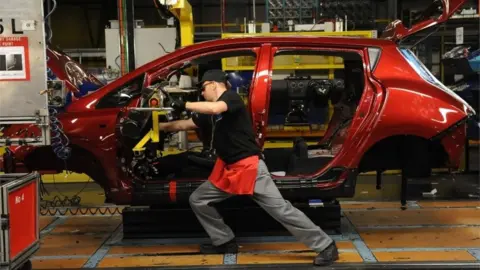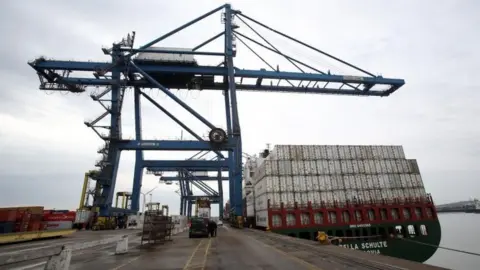UK manufacturing output picks up in July
 PA
PAThe UK's manufacturing output grew at the fastest pace this year in July, according to official figures.
Output rose by 0.5% in the month, the Office for National Statistics (ONS) said, as car production rebounded after declining in June.
Recent surveys of the manufacturing sector have suggested that it is seeing a pick-up in orders and output.
However, separate figures from the ONS indicated that there was little change in the UK's trade deficit during July.
The trade deficit in goods and services was barely changed at £2.872bn, while the deficit in goods widened slightly to £11.576bn, compared with June's downwardly revised figure of £11.527bn.
'Subdued' year
A recent survey suggested growth in the manufacturing sector was accelerating, with output, orders and employment all picking up.
In addition, earlier this week a study by the manufacturing body EEF said the sector was enjoying "buoyant conditions", with export markets going from "strength to strength".
The weakness of the pound - which makes products cheaper for buyers from abroad - has raised hopes of a boost to UK exports.
Chris Williamson, chief business economist at IHS Markit said the rebound in manufacturing output shown by the ONS data added to "hopes that rising goods production will act as a prop to the economy and help counter slower consumer spending in the second half of the year".
Despite the improvement in manufacturing output in July, the ONS figures showed the wider measure of industrial output rose by just 0.2%, slowing from June's increase of 0.5%.
Kate Davies, ONS senior statistician, said manufacturing had remained "relatively subdued since the start of the year, though July showed the first significant monthly growth of 2017, with car production increasing partly thanks to new models rolling off the production lines".
 PA
PAThe ONS's data showed that the UK's trade deficit in goods and service in the May-to-July period widened by £0.4bn from the previous three-month period to £8.6bn.
It said this was due to a widening of the goods trade deficit by £1.1bn, partially offset by an increase in the services trade surplus by £0.7bn.
Ms Davies said: "Exports of goods to the EU increased but this was offset by falling goods exports to the rest of the world."
Samuel Tombs, chief UK economist at Pantheon Macroeconomics, said: "The [monthly] trade deficit has continued to hover around the £3bn mark, showing that the economy still is failing to rebalance despite the huge fall in sterling.
"The volume of goods exports rose by 1.1% month-to-month in July, but this reversed less than half of June's 2.6% decline. The underlying trend in export volumes appears to have weakened over the summer - despite brisk growth in the eurozone - and imports are continuing to rise at a similar rate."
Rebalancing 'unlikely'
Earlier on Friday, the British Chambers of Commerce (BCC) said the UK's economy was "treading water" and there was "no sign on the horizon of a return to healthier levels of growth".
Its comments came as it tweaked its growth forecasts for the next few years. The BCC expects the economy to grow by 1.6% this year, up slightly from its previous prediction of 1.5%.
However, it has cut its growth forecast for next year to 1.2% from 1.3%, and for 2019 to 1.4% from 1.5%.
It said the cut in its forecast for next year was due to a weaker contribution from net trade, with imports expected to increase, and slower growth in consumer spending.
The BCC's director general, Dr Adam Marshall, said: "Our forecast suggests that the hoped-for rebalancing of the UK economy towards investment and export is unlikely to materialise in the medium term.
"The rising upfront cost of doing business in the UK, the uncertainty around Brexit, and the constraints created by skills gaps and shoddy infrastructure collectively outweigh any benefit arising from the recent depreciation of sterling.
"A cheaper currency does not automatically mean an export boom, no matter how some politicians and commentators will it to happen."
